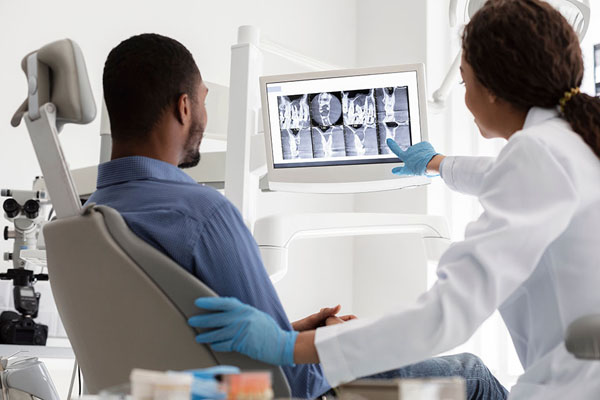Symptoms of TMJ Disorders in Knoxville, TN
Recognize TMJ Symptoms and Find Relief with Your Local Knoxville Dentist
The temporomandibular joint (TMJ) serves as a sliding hinge connecting your jawbone to your skull, making it one of the most complex joints in your body. When this intricate joint system becomes damaged or dysfunctional, it can trigger a cascade of symptoms known as temporomandibular joint disorders (TMD) that significantly impact your daily life.
If you’re experiencing persistent jaw pain, difficulty chewing, or unexplained headaches in the Knoxville area, you may be dealing with TMJ dysfunction. Don’t let chronic jaw pain control your life—our experienced Knoxville dentist specializes in TMJ disorders and can provide the comprehensive evaluation and personalized treatment you need.
Ready to find relief? Call our Knoxville dental office at (865) 687-8670 to schedule your TMJ evaluation today. We proudly serve patients throughout Knoxville, TN, and surrounding communities, including Amherst, Marble City, West Knoxville, and beyond.
Common TMJ Disorder Symptoms
Jaw Pain and Facial Discomfort
The most recognizable symptom of TMJ disorders is persistent pain in the jaw joint area and surrounding facial muscles. This TMJ pain can range from a dull, constant ache to sharp, stabbing sensations that worsen when you chew, speak, or open your mouth wide. Many patients describe feeling tenderness around the jaw joint, with pain often radiating to the chewing muscles, neck, and shoulders.
Jaw Clicking, Popping, and Locking
If your jaw makes clicking or popping sounds when you open or close your mouth, this could indicate internal joint dysfunction. These sounds occur when the disc that cushions the temporomandibular joint moves out of its proper position. In severe cases, jaw locking may occur, leaving your mouth stuck in an open or closed position—a frightening experience that often requires immediate professional intervention.
Limited Jaw Movement and Muscle Tension
TMJ dysfunction can significantly restrict your jaw’s range of motion, making everyday activities like eating, speaking, or yawning challenging. You might notice difficulty opening your mouth fully, or your jaw muscles may feel tight and fatigued even during simple movements.
Chronic Headaches and Ear Symptoms
Many TMJ disorder patients experience frequent headaches, particularly in the temple region or behind the eyes. Additionally, the close proximity of the jaw joint to ear structures can cause tinnitus (ringing in the ears), ear pain, or a feeling of fullness in the ears that’s often mistaken for ear infections.
Teeth Grinding (Bruxism) and Jaw Clenching
Nighttime teeth grinding and unconscious jaw clenching are both symptoms and contributing factors of TMJ disorders. This destructive habit places excessive stress on the jaw joint and surrounding muscles, potentially worsening existing TMD symptoms and causing additional damage to your upper and lower teeth.
Where TMJ Symptoms Commonly Manifest
TMJ disorder symptoms rarely stay localized to just the jaw joint. The interconnected nature of facial muscles, nerves, and structures means symptoms can appear throughout your head, neck, and shoulders:
Primary Areas Affected:
- Jaw Joint: Pain, tenderness, clicking sounds, limited movement
- Ears: Fullness, pain, tinnitus, popping sensations
- Head: Tension headaches, temple pain, pressure behind eyes
- Neck and Shoulders: Muscle tension, stiffness, radiating pain
- Mouth: Difficulty chewing, speaking challenges, tooth sensitivity
Types of TMJ Disorders and Their Unique Symptoms
Myofascial Pain Disorder
Myofascial pain disorder is a common form of TMD that primarily affects the muscles that control jaw movement, causing widespread facial pain and muscle tenderness. Patients often experience trigger points in their chewing muscles that can refer pain to other areas of the face and head.
Internal Joint Derangement
When the disc within the jaw joint becomes displaced or damaged, it can cause characteristic clicking or popping sounds, limited jaw movement, and pain during jaw function. Internal derangement is a condition that may progress to more severe symptoms if left untreated.
Degenerative Joint Disease
Arthritis and other degenerative conditions can affect the temporomandibular joint, causing chronic pain, joint inflammation, and progressive loss of jaw function. Degenerative joint disease is a type of TMD that often requires comprehensive long-term management.
Modern TMJ Treatment Options Available in Knoxville
Nonsurgical Treatments
Most TMJ disorders respond well to conservative, nonsurgical TMJ treatments that focus on pain relief and restoration of normal jaw function:
- Custom Mouth Guards: Protect teeth from grinding and reduce joint stress
- Physical Therapy: Specialized exercises to improve jaw movement and strengthen muscles
- Prescription Medications: Muscle relaxants and nonsteroidal anti-inflammatory drugs for pain management
- Botox Injections: Recent advancements include Botox therapy, which has shown remarkable efficacy in treating TMD by reducing muscle tension
- Trigger Point Injections: Target specific muscle knots to relieve pain and spasms
At-Home Management Strategies
- Eat Soft Foods: Reduce jaw strain during meals
- Apply Ice Packs: Decrease inflammation and provide pain relief
- Learn Relaxation Techniques: Manage stress levels that contribute to jaw clenching
- Avoid Gum Chewing: Eliminate activities that overwork jaw muscles
Advanced Treatment Options
For severe cases that don’t respond to conservative treatment, surgical interventions like TMJ arthroscopy or open joint surgery may be recommended by oral surgeons or specialized healthcare professionals.
Frequently Asked Questions
Persistent jaw pain, difficulty opening the mouth, clicking during chewing, or chronic headaches linked to jaw movement warrant a consultation with our Knoxville dentist specializing in TMJ disorders. Early intervention often leads to better outcomes and can prevent symptoms from worsening.
While treatment timelines vary depending on the severity of your condition and chosen treatment approach, many patients begin experiencing relief within weeks of starting appropriate therapy. Conservative treatments like mouth guards and physical therapy often provide gradual improvement, while some patients notice immediate benefits from procedures like trigger point injections.
Our Knoxville dental practice specializes in diagnosing and treating TMJ disorders, serving patients throughout East Tennessee, including West Knoxville, Amherst, and Marble City. We work closely with physical therapists, oral surgeons, and other healthcare professionals to ensure you receive comprehensive care.
Don’t Let TMJ Pain Control Your Life — Get Help in Knoxville Today
Living with chronic jaw pain and TMJ dysfunction doesn’t have to be your reality. With proper diagnosis and treatment from an experienced dentist in Knoxville, you can find relief and enjoy daily activities without discomfort. Our comprehensive approach combines the latest techniques with personalized care, ensuring effective therapy for your specific condition.
Take the first step toward relief—contact our TMJ dentist in Knoxville at (865) 687-8670 to schedule your consultation. Serving Knoxville, TN, and surrounding areas, don’t wait—early treatment often leads to better outcomes. Your journey to TMJ relief begins with a phone call. Let our team help you reclaim your comfort and quality of life.


